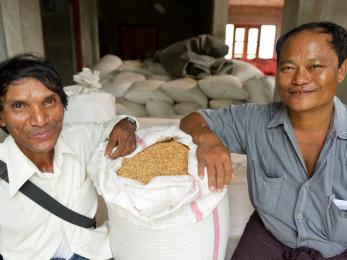Breadcrumb
Myanmar

Mercy Corps has been working in Myanmar since 2008, helping to build peaceful, productive, and resilient communities. In 2020, our work reached over 1 million people across the country.
The context
For decades, the people of Myanmar have endured ethnic conflict, military rule, and devastating natural hazards. Despite a period of steady economic growth and increased democratization, the recent military coup represents a major setback for the fragile democracy which only began about a decade ago after half a century of military rule. The resulting political and economic crisis fuels fears of renewed armed conflict and adds yet another dimension to the existing humanitarian and human rights challenges.
The past year has been a difficult one with intensifying armed conflict, increasing pressure for accountability for war crimes, deteriorating freedom of expression, a collapsing economy, and the devastating impact of the COVID‑19 pandemic.
While poverty rates were nearly cut in half, dropping from 48 percent to 25 percent between 2005 and 2017, deep rooted inequalities have hindered even greater potential for equitable growth and progress. And now, the effects of the COVID‑19 pandemic on the economy threaten to reverse this progress. The rapid development in the past years has attracted young people to the cities, although their lack of transferable skills makes it challenging for them to find work. The potential of young people remains largely untapped.
-
1m
-
1m
-
2nd
Agriculture remains the largest contributor to GDP, and more than 65 percent of the population is finding employment in the sector. However, agriculture production remains low. Major inefficiencies and inequities exist in agricultural market systems and distribution networks, and the sector overall remains vulnerable to climate change impacts, particularly in the coastal areas. Though Myanmar’s natural resources (hydropower, petroleum, fisheries, forestry, and mining) are vast, they remain largely unexploited and at times a source of conflict. An overwhelming majority of people in Myanmar are living without electricity.
The aftermath of a deadly crackdown by Myanmar's army on Rohingya Muslims living in Rakhine State in 2017 has led to more than 700,000 people fleeing the country to neighboring Bangladesh. Prospects for returns are low while at the same time the remaining Rohingyas and other ethnic Muslim minorities continue to suffer from discriminatory laws and regulations.
Despite periods of political reform, the capacity of government systems to deliver in an equitable and functional manner remains low. Most community members have no or little chance to participate in democratic processes — this is especially true for women and youth. At the same time, the government’s formal peace talks are not making much progress, and conflict between the Army and Ethnic Armed Organizations (EAOs) is continuing, resulting in more internal displacements.
Our impact
Since 2008, we have partnered with communities to rebuild after disaster and bring about peace, stability, and economic growth that includes all people. Our vision is for communities to have the tools and resources they need to tackle their challenges and determine their own future. We focus on these three areas:
- Strengthening trust
- Accelerating inclusive and green economic growth
- Responding to emergencies and strengthening resilience
As Myanmar continues to face COVID‑19, we have adapted our programs so that we can continue to work alongside communities safely, while also working to reduce tensions that have arisen as a result of the pandemic.
Strengthening trust
We strive to build strong and peaceful communities in which all people have a voice and opportunity to meaningfully engage in local decision-making processes.
Our work begins within communities themselves, creating opportunities for constructive dialogue, building skills in conflict prevention and resolution, and promoting the protection of rights for all. Strengthening trust between Myanmar’s diverse ethnic and religious groups is a critical step in building a foundation for peace.
We also work with local government actors to help make decision-making processes more responsive, inclusive, and accountable to communities’ needs while simultaneously equipping individuals with the knowledge and tools needed to stand up for their own rights.

Accelerating inclusive and green economic growth
While Myanmar was one of the fastest growing countries in the world, economic growth alone won’t solve poverty. That’s why Mercy Corps is working to improve access to livelihood opportunities for everyone — especially youth and women — and help industries be more resilient to future crises.
We help farmers and entrepreneurs increase their productivity and incomes by accessing new technologies, adopting diversified and environmentally-friendly agricultural practices, and accessing financial services like loans and insurance.
We also know that economic growth requires some level of peace and stability. We continue to explore and support the ways in which these are interconnected, especially in Myanmar’s conflict-ridden ethnic areas.

Responding to emergencies and strengthening resilience
Mercy Corps is partnering with communities and local leaders to better prepare for, cope with, and respond to both man-made and climate-related disasters. In the immediate aftermath of a crisis, we often provide cash to help people purchase basic necessities and get back on their feet while also jumpstarting the local economy.
We also help communities adopt the use of new, more sustainable practices, and better preparedness and response capabilities so they can recover quicker after ecological and climate-related events like erratic rainfall, drought, cyclones, floods, and agricultural pests and disease. We work with companies to increase access to products that have less impact on the environment like low-carbon cookstoves and products that reduce climate-related risks like crop insurance. At the same time, we help individuals adopt these practices and technologies, ultimately enhancing resilience to future crises.




